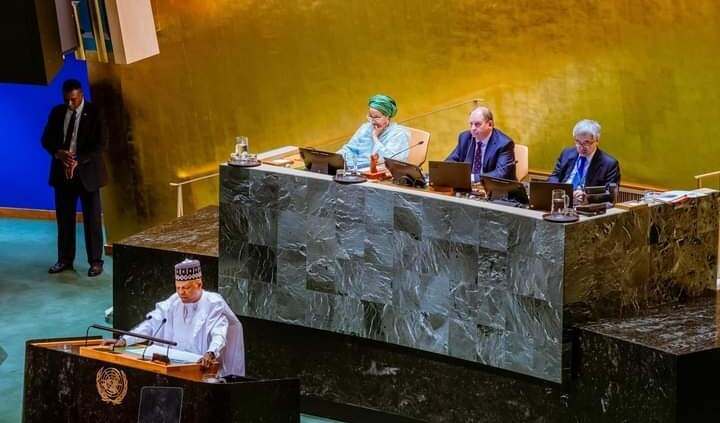President Bola Tinubu has called on creditors and multilateral financial institutions to grant debt forgiveness for Nigeria and other developing nations. He made this appeal during his address to world leaders at the General Debate of the 79th Session of the United Nations General Assembly (UNGA) in New York. His speech was delivered by Vice President Kashim Shettima, who represented him at the global forum.
In his remarks, Tinubu stressed the urgent need for reforms in the international financial system, advocating for a fair and transparent multilateral trading system. He expressed hope that the adoption of the “Pact for the Future” could reshape global economies and lead to tangible measures that would address the challenges faced by both developed and least-developed nations.
“For these reasons, we reiterate the call for reforms of the international financial architecture and the promotion of a rules-based, non-discriminatory, open, fair, inclusive, and transparent multilateral trading system,” Tinubu stated.
He highlighted the growing global debt burden, which he said is hampering nations’ abilities to meet the needs of their citizens. Tinubu also pointed out that trade barriers and protectionist policies are stifling opportunities for many nations, and that intense global competition discourages investment.
“Reforms must include comprehensive debt relief measures to ensure sustainable financing for development,” Tinubu emphasized. He added that countries in the Global South cannot achieve meaningful economic progress without special concessions and a thorough review of their current debt burdens.
Furthermore, Tinubu called for the recovery of assets obtained through corruption and illicit financial flows. He stressed that returning such funds to their countries of origin is a key principle of the United Nations Convention against Corruption.
“The international community must adopt practical measures to enhance cooperation in recovering stolen assets and eradicating safe havens that allow illicit funds to flow from developing to developed economies,” he added.
Tinubu also urged world leaders to recommit to multilateralism by deepening relations among UN member states in line with principles of inclusivity, equality, and cooperation. He warned against the dangers of nationalism and singularity, which he said undermine collective efforts to solve global challenges such as terrorism, climate change, poverty, hyperinflation, and nuclear proliferation.
He reminded the assembly that the United Nations was founded on the ideals of multilateralism, peace, sustainable development, and human rights—principles that are now at risk due to the prioritization of individual national interests.
“Today, the pillars of our organization are under threat, not by external forces, but by the relentless pursuit of individual national priorities rather than the collective needs of nations gathered here,” Tinubu said. “While multilateralism offers the surest path to addressing these existential challenges, the turn towards singularity and nationalism is undermining this collective aspiration.”
In concluding his speech, Tinubu reaffirmed Nigeria’s unwavering commitment to multilateralism, a stance it has maintained since joining the United Nations 65 years ago as the 99th member state.
